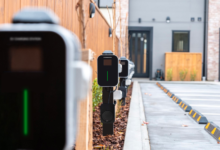Electric Vehicle Innovation: The New Era Of Sustainable Mobility

From startups to automotive giants, governments to consumers, every stakeholder is aligning with the clean energy vision. No longer a futuristic fantasy, the electric vehicle is redefining how the world moves—one silent mile at a time.
The increasing urgency to combat climate change, reduce reliance on fossil fuels, and transition to smarter cities has made electric mobility not just an option but a necessity. Let’s explore how the electric vehicle is powering a cleaner, greener, and more efficient automotive landscape.
Understanding the Rise of the Electric Vehicle
In simple terms, an electric vehicle (EV) is powered either partially or fully by electricity stored in batteries, rather than gasoline or diesel. While the concept has been around since the 19th century, it is only in the last decade that EVs have gained widespread commercial attention and adoption.
This resurgence is powered by three key factors:
- Government Policy and Incentives
Many governments have introduced subsidies, tax exemptions, and infrastructure support to encourage EV adoption. Countries like Norway and China are leading the way, with high penetration rates and clear roadmaps to phase out internal combustion engines. - Consumer Awareness and Demand for Sustainability
More people are conscious of their carbon footprint. Choosing an electric vehicle aligns with ethical consumerism, especially among younger generations looking to reduce environmental harm.
Startups Leading the EV Revolution
While companies like Tesla have become synonymous with the electric vehicle movement, numerous startups are entering the space with niche offerings and innovation-driven solutions.
- Rivian: This American startup focuses on electric trucks and SUVs, targeting the adventure and utility segment.
- Arrival: Based in the UK, Arrival is designing modular EVs specifically for public transport and delivery fleets.
- Ola Electric: An Indian company revolutionizing two-wheeler EVs for the Asian market.
Startups play a critical role by challenging industry norms and introducing new concepts such as battery swapping, solar-integrated roofs, or compact city cars tailored for urban congestion.
Benefits of Driving an Electric Vehicle
🔋 Lower Operational Costs
Electricity is cheaper than gasoline. On average, EV owners spend 50-70% less on fueling and up to 40% less on maintenance since EVs have fewer moving parts.
🚗 Smooth and Silent Ride
An electric vehicle delivers instant torque, resulting in a smoother acceleration experience. The absence of engine noise also adds to the comfort of driving.
💡 Smart Technology Integration
EVs often come with advanced driver-assistance systems (ADAS), remote diagnostics, smart dashboards, over-the-air updates, and AI-based navigation systems—features rarely found in older combustion-engine vehicles.
See also: Get Your Car Looking Like New Again: Trusted Car Body Repairs in Telford
EV Charging Ecosystem: A Growing Business Opportunity
Innovations in this space include:
- Battery Swapping Stations (NIO, China)
- Vehicle-to-Grid Integration (V2G)
- Solar-Powered Charging (Sunrun, Tesla Solar Roof)
These developments make it easier, faster, and greener to charge electric vehicle electric vehicles while reducing dependency on fossil-fuel-based electricity.
The Role of Artificial Intelligence in EVs
- Range Prediction Algorithms: More accurate estimation of distance left based on driving style and terrain.
- Smart Route Planning: Suggests charging stops and optimal routes in real-time.
- Predictive Maintenance: AI can forecast part failures and maintenance needs before they happen.
Self-driving technology is also being embedded in EV platforms, setting the stage for fully autonomous electric fleets in the near future.
Corporate Adoption and Fleets
More businesses are switching to electric vehicle fleets to reduce their environmental impact and cut down on operating costs. Companies like Amazon, UPS, and DHL have committed to large-scale EV integration for last-mile delivery and transportation.
Even ride-hailing platforms like Uber and Lyft have announced plans to become fully electric by 2030 in several key markets.
The Road Ahead: What the Future Holds
By 2030, it’s estimated that over 50% of all new car sales globally will be electric. With solid-state battery technology on the horizon, EVs will soon offer greater range, faster charging, and longer battery life.
Further innovations to watch for include:
- Bi-directional Charging: Use your EV to power your home or sell energy back to the grid.
- Subscription-Based EV Ownership: Pay a monthly fee for usage, maintenance, and upgrades.
- Autonomous EV Taxis: A blend of self-driving and electric mobility for smart urban commuting.
Conclusion: Electric Vehicle Adoption is Just Beginning
The electric vehicle isn’t just a cleaner way to drive—it represents a broader shift toward smart, efficient, and ethical consumption. As consumers, businesses, and governments align, the EV industry will continue to innovate and expand.
Whether you’re a tech-savvy early adopter or a business leader exploring fleet options, now is the time to get on board. The journey toward an electric future isn’t a trend—it’s the new standard.


